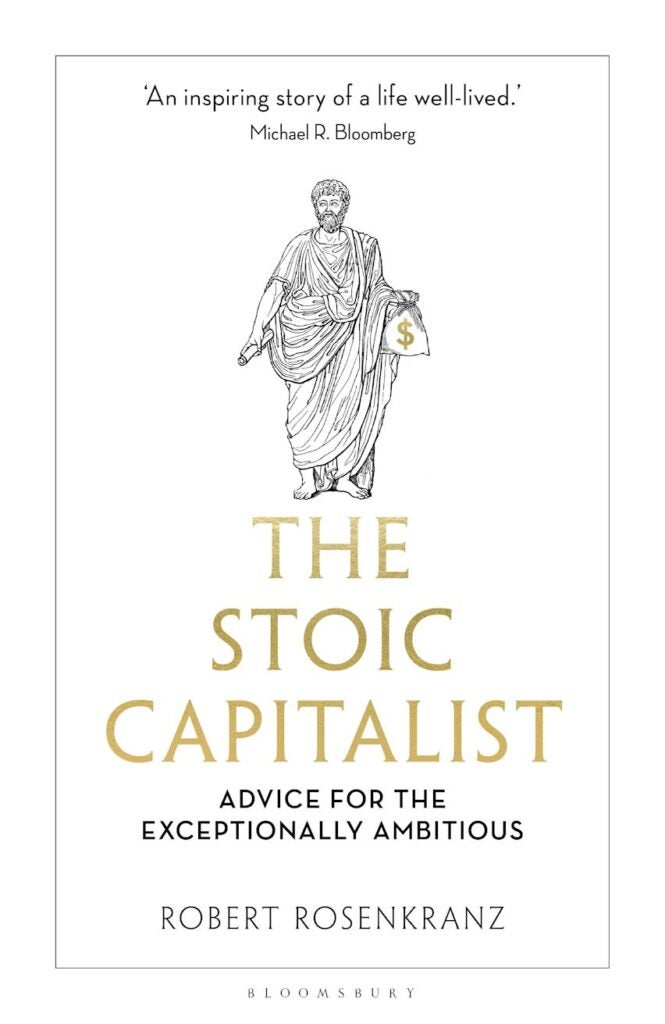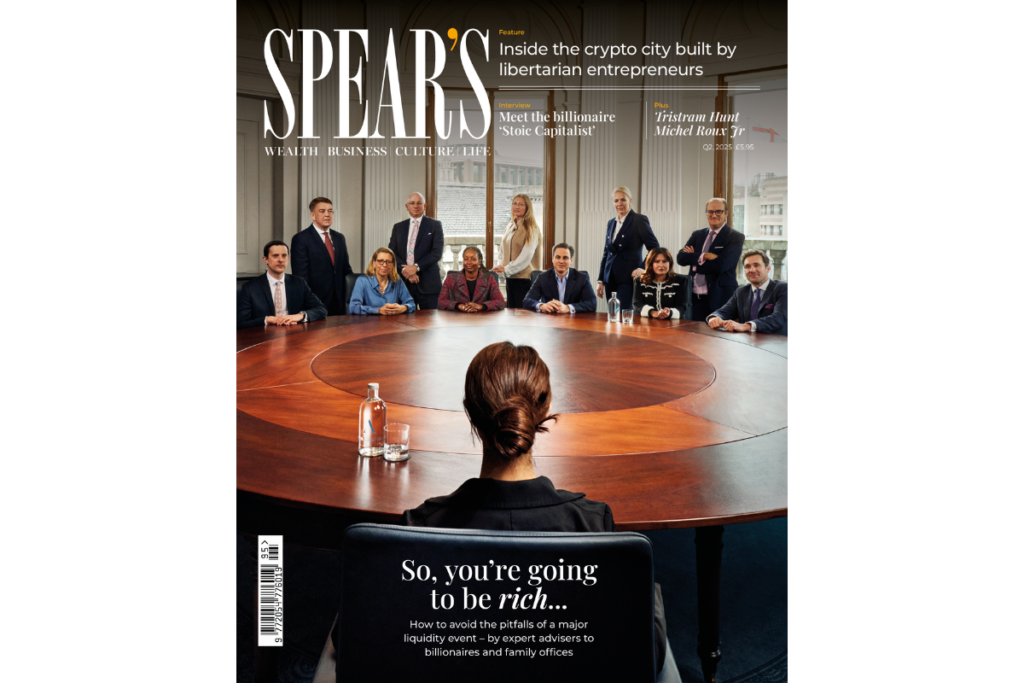
According to hedge fund manager turned bestselling author and political activist Bill Browder, Robert Rosenkranz is ‘one of the most powerful titans on Wall Street that you probably haven’t heard of’.
That might soon change, however, as Browder’s comment appears on the jacket of an advance copy of Rosenkranz’s new book. And it’s the promotion of said book that brings Spear’s and its author together today.
As we settle down to peruse the lunch menu at China Tang, the Dorchester hotel’s subterranean hideaway, I tell Rosenkranz I picked the venue as a nod to his fondness for Chinese art, which he mentions in the book. ‘Well, I don’t know the place,’ he says quietly. ‘But it’s pretty, uh… convenient. So this is great.’
Rosenkranz, 82, is small of stature and dressed in an open-necked shirt, grey trousers and blue blazer (accessorised with a Rolex Submariner). He was born in New York but is, in some sense, a local.
He has a place in Mayfair and spends a couple of months a year in London. He also has homes in Manhattan, East Hampton and Aspen, where his wife, the art curator Alexandra Munroe, chairs the Aspen Music Festival and School.
Rosenkranz prefers to have a light lunch and I prefer not to spend too long looking at the menu, so we ask the waiter to pick out a selection of dim sum.
The Stoic Capitalist
‘I didn’t want to write a memoir,’ Rosenkranz tells me of the book project, born from a conversation with a niece and nephew who were interested in the ‘life lessons’ he might be able to impart. The solution he eventually came upon was to use ‘Stoic philosophy and cognitive behavioural psychology as a kind of intellectual armature around which the book could be built’, he says.

The result – written by Rosenkranz in 18 months, with some input from an editor who worked on a book with Alan Greenspan – is The Stoic Capitalist: Advice for the Exceptionally Ambitious.
In essence it is an autobiography divided into 45 short chapters, many of which have titles that are pithy or somewhat playful imperatives, such as ‘Get Rich Slowly’ and ‘When the World Changes, Adapt’. Within them, he details key moments from his life and career alongside more general ruminations on everything from the state of the Republican Party to the latest developments in longevity science.
Rosenkranz writes that he knew his parents loved him, but his childhood was filled with anxiety. From the age of seven he was aware of the family’s money troubles and he was ‘frightened’, in particular, by his mother’s outbursts of ‘emotional intensity’.
‘There were big obstacles, but the way around those obstacles was to take responsibility for my own life,’ he says. ‘The obstacle became the way, and that’s a classic Stoic idea.’
[See also: DKMS chairwoman Katharina Harf on her mother’s legacy and 12 million donors]
He was a gifted student, with an interest in mathematics that was encouraged by his father through puzzles and games. He got into Yale and graduated summa cum laude, then studied at Harvard Law School before becoming a tax lawyer and later joining the RAND Corporation as an economist. He then went to work for a private equity firm before, at the age of 35, teaming up with a wealthy backer and investing the entirety of his own net worth at the time ($400,000) into a new private equity business, Rosenkranz & Co.
Shortly after the stock market crash of 1987, the firm acquired an insurance business, Reliance Standard Life. (Rosenkranz believes he could have renegotiated the price of $220 million, but chose not to: ‘a reputation for integrity is more important than the dollars I left on the table’.)
[See also: Prominent philanthropists call for UK to give more]
He installed himself as CEO, renamed it Delphi and moved away from private equity dealmaking, instead choosing to focus on just one business, building it for the long term by encouraging an enlightened attitude to risk. ‘The point is not to minimise risk,’ he writes. ‘It’s to price it correctly. There is no such thing as a bad insurance risk: there is just a risk where the premium is inadequate.’
It worked, and in late 2011 it was announced that Delphi was to be acquired by the Japanese conglomerate Tokio Marine for $2.7 billion.
Rosenkranz, who was the controlling shareholder of Delphi, is described as a ‘billionaire’ in a press release for his book, but it’s not easy to establish precisely how much he made from the deal, or how much he is worth today. (He is not included in the Forbes list of billionaires.) Press coverage around the time of his divorce from his first wife in the mid-Nineties put the couple’s joint fortune then at $200 million.
[See also: Trump doubles his fortune as Musk breaks wealth record in world rich list]
‘I probably made as much money personally as the top guys in the more prominent buyout firms,’ Rosenkranz says now. ‘I still look at that wistfully. I wonder: did I really do the right thing by getting myself committed to a single enterprise, a single industry, as opposed to the more fluid way in which you can operate in the private equity space?’
Honey-glazed pork ribs arrive and we um and ah for a while before deciding that using one’s fingers is the best option. A selection of dumplings and dipping sauces follows, which can be dispatched more elegantly with chopsticks.
From Marcus Aurelius to Rockefeller
The habits of mind he developed during childhood meant he’d been a believer in Stoicism before he even knew what it was, Rosenkranz says. But he has since expanded his understanding by studying Stoics such as Roman emperor Marcus Aurelius and Greek philosopher Epictetus, who was born into slavery. (He also makes a link between Stoicism and the more modern practice of cognitive behavioural therapy, or ‘CBT’).
One of the core tenets or ‘precepts’ of Stoicism is to embrace rationality to the full, but ‘Stoicism is not about repressing emotion. Emotions are human. Getting angry is perfectly natural. You should get angry. But should you act angrily? That should be a conscious decision. Will acting angry at this particular moment help produce an outcome that works for me? The answer to that question is – 90 per cent of the time – “No.”’
[See also: James Reed: Why entrepreneurs should make philanthropy part of their company’s DNA]
Rosenkranz also cites Carnegie and Rockefeller as sources of inspiration, and he has forthright views on the nature of philanthropy. For him, it should not be understood as ‘giving back’.
‘If you build a successful business, you’re not taking anything away,’ he says. ‘You don’t owe anything [that needs to be paid] back. But philanthropy is a way to enrich your own life and to use your talents and abilities to provide something that society needs, and that’s what Rockefeller and Carnegie did.’
With what he describes as his ‘vastly more limited means’, Rosenkranz has spent many of the past few years trying to do something similar in spirit.
[See also: How philanthropy can unlock new opportunities for UHNW advisers]
One avenue has been to offer an alternative to the culture of polarised tribalism by encouraging nuanced, reasoned debate.
To do this, he made a deal to run Intelligence Squared debates in the US, beginning in 2006. In 2023, he rebranded the American operation as Open to Debate; its debates are now broadcast on public radio in the US. (He says one recent discussion on Gaza was downloaded 6 million times.)
Would we like anything else, asks the waiter. ‘I’d be happy with a hot and sour soup,’ says Rosenkranz, so we order two.
Rosenkranz’s philanthropic ventures
Another of Rosenkranz’s philanthropic projects is a new cultural venue that he hopes will act as a home for digital art exhibits. ‘What’s drawn me to it is the sense that it’s the natural language of young people,’ he says of the medium.
‘They get all of their information on screens. They do all their communicating on devices.’
He has purchased premises on New York’s Lower East Side and plans to call the space ‘Canyon’.
The third major string to his philanthropic bow relates to the people at the other end of their lives. The penultimate chapter of the book is ‘You Can Make More Money; You Cannot Make More Time’, but the final chapter is ‘Maybe You Can Make More Time’.
[See also: The £54,000-a-year health clinics helping the super-rich live longer]
This alludes to Rosenkranz’s interest in longevity science and his role as a benefactor of a programme called Impetus Grants; in 2023 it was announced he would donate $5 million from his own foundation, alongside a further $5 million from Saudi-based non-profit the Hevolution Foundation, to support 35 grantees.
One of the projects he’s keeping tabs on is an experiment using a species of worm called C. elegans, which is being subjected to ‘every single intervention that’s been proved to work, all at once’.
The worm is used for longevity experiments because ‘its lifespan is 15 days, so if you can extend its life span by 30 per cent, you know within three weeks. So you get very, very quick feedback. We’re backing a scientist whose objective was to get this worm to live for a year: 25 times its normal lifespan. We’re 250 days into this and 64 per cent of the worms are still alive.’
‘That’s 17 times its normal lifespan. It’s an extension of lifespan orders of magnitude greater than anybody ever thought possible.’
[See also: Philanthropy: climate activists should leave the sustainability echo chamber behind]
By this time we have polished off our soups and are making our way through a pot of green tea, which is delivered to the table with a pair of chocolates.
Continuing on the longevity theme, Rosenkranz says his own biological age is probably 10 or 12 years younger than his chronological age – ‘and it’s going down’. How has he managed that?
‘The only thing I would talk about is diet and exercise,’ he says. ‘I wouldn’t want people copying medical things, right? I’m not a doctor. I’m not gonna prescribe anything to the readers of a magazine.’
Our tea is finished and I’ve eaten my chocolate, but Rosenkranz has left his untouched. He shakes my hand, says goodbye, and steps out onto Park Lane.
This article first appeared in Spear’s Magazine Issue 95. Click here to subscribe







